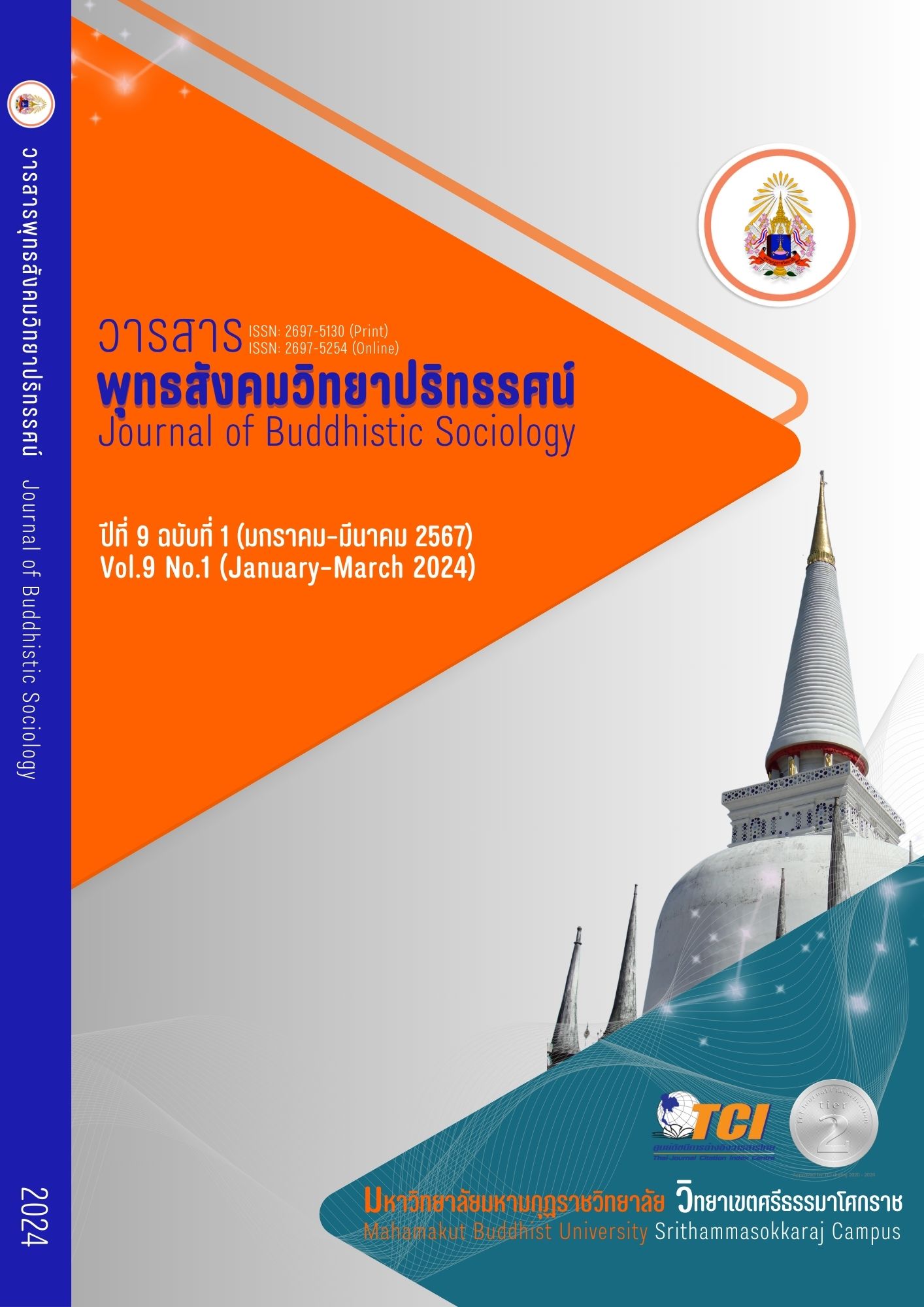ROLES OF MONKS IN TEACHING MODERN MORALITY FOR THAI SOCIETY DEVELOPMENT
Main Article Content
Abstract
This article aimed to study 1) the roles of monks in teaching morality and their expectations in performing their missions, 2) the problem situations of monks in teaching morality in educational institutions, and 3) methods for developing the monks in teaching morality according to Buddhist guidelines. Data were collected through documents and studies of the concepts of the role of monks in teaching morality, including principles related to methods for developing the role of moral teaching monks according to Buddhist guidelines.
The results of the study found that:
- Morality teaching monks had the roles and responsibilities in teaching and learning, academic work, cultural inheritance, human relations, evaluation of using teaching media effectively and being able to adjust the teaching curriculum to be in line with the environment development policy. Expectations in the moral teaching mission of modern moral teaching monks for the development of Thai society focused on teaching that integrates morality into the subjects so that the children are aware of being moral.
- Problems with teaching morality monks in educational institutions included teachers not understanding how to explain and apply the teaching methods to make students interested. There was no presentation method appropriate for the age of the students. There was a lack of continuous organizing of Buddhist teaching moral activities. Finally, multimedia was used without the availability of materials and equipment.
- Methods for developing the roles of moral teaching monks according to Buddhist principles were as follows: Moral teaching monks must be friendly and behave lovingly towards students and the general public. They should be moral teaching monks with stability, be praised for having good behavior and being worthy of respect, know and guide students in the right direction, explain from cause to effect, and have self-development according to the four principles of Bhàvanà.
Article Details

This work is licensed under a Creative Commons Attribution-NonCommercial-NoDerivatives 4.0 International License.
References
กรมการศาสนา. (2553). คู่มือพระสอนศีลธรรมในโรงเรียน. กรุงเทพมหานคร: โรงพิมพ์การศาสนา.
กระทรวงศึกษาธิการ. (2548). คู่มืออบรมหลักสูตรการส่งเสริมสุขภาพจิตและป้องกันปัญหาสุขภาพจิตของประชาชนโดยพระสงฆ์. กรุงเทพมหานคร: โรงพิมพ์การศาสนา.
พระปลัดปรีชา นนฺทโก (จุลเจือ). (2560). การศึกษาแนวทางการพัฒนาศักยภาพพระสอนศีลธรรมโรงเรียนมัธยมศึกษาสังกัดสำนักงานคณะกรรมการการศึกษาขั้นพื้นฐาน ในจังหวัดระยอง. ใน วิทยานิพนธ์พุทธศาสตรดุษฎีบัณฑิต สาขาวิชาพระพุทธศาสนา:มหาวิทยาลัยมหาจุฬาลงกรณราชวิทยาลัย.
พระพรหมคุณาภรณ์ (ป.อ.ปยุตฺโต). (2546). พจนานุกรมพุทธศาสตร์ ฉบับประมวลธรรม (เล่มที่ 12). กรุงเทพมหานคร: โรงพิมพ์การศาสนา.
มหาวิทยาลัยมหาจุฬาลงกรณราชวิทยาลัย. (2539). พระไตรปิฎกฉบับภาษาไทย ฉบับมหาจุฬาลงกรณราชวิทยาลัย. กรุงเทพมหานคร: โรงพิมพ์มหาจุฬาลงกรณราชวิทยาลัย.
สำนักงานพระสอนศีลธรรม. (2551). คู่มือปฏิบัติงานโครงการพระสอนศีลธรรมในโรงเรียน. เชียงใหม่: มหาวิทยาลัยมหาจุฬาลงกรณราชวิทยาลัย วิทยาเขตเชียงใหม่.
อัจศรา ประเสริฐสิน. (2558). การพัฒนารูปแบบการวัดคุณลักษณะอันพึงประสงค์ 8 ประการของ นักเรียนระดับชั้นมัธยมศึกษา. วารสารบรรณศาสตร์ มศว., 8(2), 56-68.


